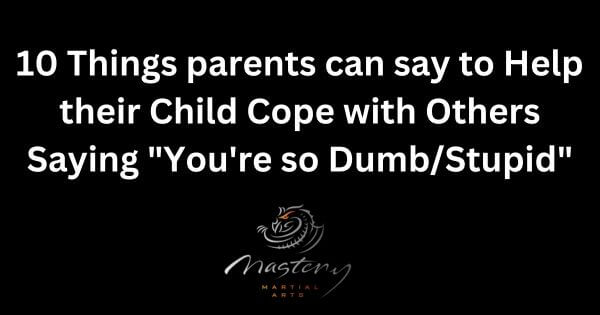Knowing what and how to help your child through the language patterns of Mean Kids.
Navigating the complexities of growing up isn’t easy for our children. Sometimes they encounter people who say things to hurt them, things that can affect their self-esteem and self-worth. “You’re so dumb” or “You’re so stupid” are words no child should hear. Yet, if they do, it’s essential we help them process those moments. Here are some reassuring statements to help guide them:
- Redefine Intelligence: “Hey buddy, just because someone says you’re dumb doesn’t mean it’s true. I see you solving problems and understanding things every day. That takes a special kind of intelligence they might not even see.”
- Understanding Emotions: “When people say hurtful things like ‘you’re so stupid’, it’s usually because they’re upset about something in their own lives. They’re trying to make themselves feel better by making someone else feel bad. They make a wrong choice in expressing their feelings. You, on the other hand, are way smarter in handling your own feelings.”
- Affirm Their Abilities: “You know, someone’s words can’t change the truth about you. And the truth is, you’re a brilliant kid with lots of skills and abilities. Have you ever noticed how good you are at puzzles or problem solving? That’s proof of a strong mind at work.”
- Celebrate Their Growth: “Remember once when you had a hard time with your science homework, but after a few tries, you got it? Doesn’t that show great effort and determination? Intelligent people learn from their mistakes – and we both know you do that very well.”
- Empower Self-Recognition: “Just like everyone else, you have a strong inner part of you that is capable and smart, regardless of what people say. Having someone tell you ‘you’re stupid’ doesn’t mean you are. What are some moments where you’ve felt smart and capable?”
- Reflect on Their Achievements: “Next time someone tells you ‘you’re so dumb’, think about all the times you’ve proven them wrong. Remember that model airplane you built? Or when you learned to ride a bike? Both are perfect examples which show your intelligence.”
- Broken Mirrors: “Hearing ‘you’re stupid’ can hurt, but it’s not a reflection of who you are. It’s like a mirror that’s been broken – it just shows a distorted image, not a real one. You’re a bright, clever kid and we know it.”
- Celebrate Their Inner Beauty: “When someone says ‘you’re dumb’, they might just be trying to hurt your feelings or feel superior. But remember, each one of us has our strengths and weaknesses, and you have so much strength in you. You have an intelligent mind, and more importantly, a kind heart.”
- Practical Knowledge: “Remember when we went camping and you were the only one who could start a fire? That takes intelligence and skill. So ‘dumb’? Definitely not you. You have practical knowledge which is very valuable.”
- A Constant Learner: “People may tell you ‘you’re stupid’, but that doesn’t define you. You’re smart, capable, and have an amazing ability to learn. Can you think of a time when you learned something new and it eventually became easy? That’s the sign of a strong and growing mind.”
Parents, our words hold power. They can either build our children up or tear them down. In moments when the outside world tries to diminish their light, it’s our responsibility to make sure they continue to shine bright. Let’s ensure our children know their worth and are equipped to face any challenges with confidence and grace
Mastery in Martial Arts: More Than Just Combat
In concluding our conversation about building our children’s self-worth and resilience, it’s worth touching on the lessons that can be drawn from the world of martial arts. Martial arts is not merely about combat or self-defense; it’s a journey towards mastering oneself.
Martial arts teach discipline, respect, patience, and humility. Just as we guide our children through the hurtful words of others, martial arts training assists in molding an individual to face life’s challenges head-on. Every time martial artist steps onto the mat, they learn to face their fears, push their limits, and embrace both victories and failures.
In the dojo, as in life, there are both advances and setbacks. Martial arts emphasize that true strength is not about overpowering an opponent, but understanding and mastering one’s emotions, reactions, and choices. As parents, guiding our children towards activities like martial arts can be a stepping stone in helping them build not just physical, but also emotional and mental resilience.
If our children can adopt even a fraction of the dedication, respect, and humility that martial arts promote, they will undoubtedly be better equipped to handle the ups and downs of life, ensuring that words like “you’re stupid” lose their sting and instead become reminders of their inner strength and capabilities.
